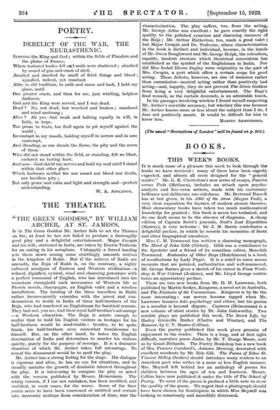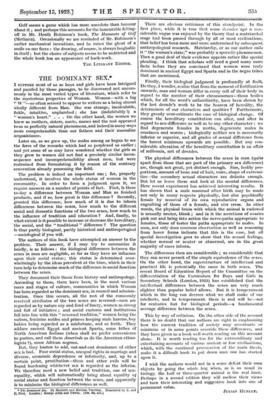BOOKS.
THIS WEEK'S BOOKS.
IT is much more of a pleasure this week to look through the books we have received : many of them have been eagerly expected, and almost all seem designed for the "general reader." Mr. G. K. Chesterton's new series of essays, Fancies versus Fads (Methuen), includes an attack upon psycho- analysts and free-verse writers, made with his customary brilliance and deliberate one-sidedness. Mr. Bertrand Russell has at last given, in his ABC of the Atom (Kegan Paul), a very clear exposition for laymen of modern atomic theories. Most elementary books have taken too much mathematical knowledge for granted : this book is never too technical, and its one fault seems to be the absence of diagrams. A cheap edition of Captain Scott's journals, Scott's Last Expedition (Murray), is very welcome : Sir J. M. Barrie contributes a delightful preface, in which he records his memories of Scott and other biographical anecdotes.
Miss C. M. Townsend has written a charming monograph, The Mind of John Gibb (Nisbet). Gibb was a contributor to the Spectator and a friend of its sometime editor, Meredith Townsend. Embassies of Other Days (Hutchinson) is a book of recollections by Lady Paget. It is a relief to come across memoirs that are pointed, authoritative and well-mannered. Mr. George Barnes gives a sketch of his career in From Work- shop to War Cabinet (Jenkins), and Mr. Lloyd George contri. butes an appreeiatory preface.
There are two new books from Mr. D. H. Lawrence, both published by Martin Seeker, Kangaroo, a novel set in Australia, and The Fantasia of the Unconscious. Kangaroo is by far the more interesting : our nerves become ragged when Mr. Lawrence bounces into psychology and ethics, but his genius as a novelist is beyond dispute. Captures (Heinemann) is a new volume of short stories by Mr. John Galsworthy. Two notable plays are published this week, The Secret Life, by Harley Granville Barker (Chatto and Windus), and The Rumour, by C. V. Munro (Collins), Even the poetry published this week gives promise of enjoyment to the reader. There is a long, and at first sight difficult, narrative poem Judas, by Mr. T. Sturge Moore, sent us by Grant Richards. The Poetry Bookshop has a new book of Mrs. Frances Cornford's, Autumn Morning, decorated with excellent woodcuts by Mr. Eric Gill. The Poems of Edna St. Vincent Millay (Seeker) should introduce many readers to an American poet who writes in a more or less English manner. Mrs. Meynell left behind her an anthology of poems for children between the ages of ten and fourteen. Messrs. Collins have now published it under the title of The School of Poetry. To most of the pieces is prefixed a little note to show the quality of the poem. We regret that a photograph should have been chosen for frontispiece in which Miss Meynell was looking so consciously and incredibly distressed. Golf Seems a game which has more anecdote than humour about it ; and perhaps this accounts for the lamentable falling- off in Mr, Heath Robinson's book, The Humours of Golf (Methuen). Occasionally we are reminded of Mr. Robinson's earlier Mechanical inventions, and he raises the ghost of a smile on our faces : the drawing, of course, is always laughable in itself ; but the choice of subjects seems to be restricted ad the whole book has an appearance of hack-work.
TEE LITERAUT EDITOR.



































 Previous page
Previous page